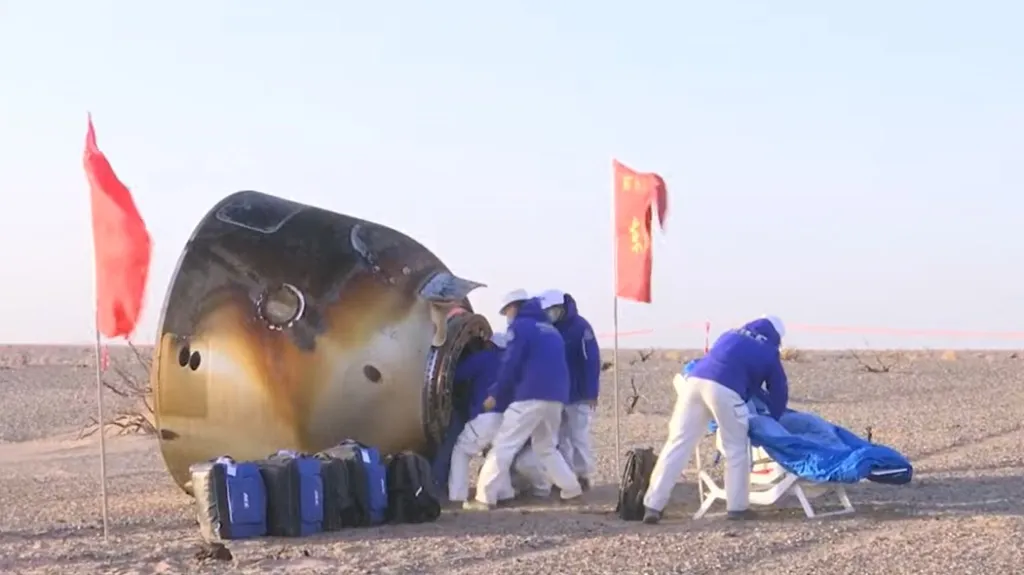Science
Chinese Astronauts Safely Return After Space Debris Delay

The crew of the Shenzhou-20 spacecraft successfully returned to Earth on November 14, 2025, following a delay caused by damage from space debris. The spacecraft had sustained a crack in its window, prompting the astronauts to utilize the newly arrived Shenzhou-21 for their return. Originally scheduled to land on November 5, the mission was postponed to ensure the safety of the crew, comprising Chen Dong, Chen Zhongrui, and Wang Jie.
Upon receiving reports of the impact, mission controllers at the China Manned Space Agency (CMSA) and the China Manned Space Engineering Office (CMSEO) initiated a thorough inspection of the Shenzhou-20. On November 11, the CMSEO confirmed that backup plans were in place as the crew continued to assess the situation. Ultimately, the decision was made to depart from the Tiangong space station aboard the Shenzhou-21 at 10:14 p.m. EST (7:14 p.m. PST) on November 13.
The crew landed safely in Inner Mongolia at 11:14 a.m. Beijing Time on November 14, 2025 (9:14 p.m. EST; 6:14 p.m. PST on November 15). Medical teams conducted examinations and reported that all crew members were in good health, as stated by the state-owned media company Xinhua.
Historic Achievements Amidst Challenges
During their mission, the Shenzhou-20 crew achieved several significant milestones. Commander Chen Dong completed six extravehicular activities, making him the taikonaut with the highest number of such tasks to date. The crew also became the first to spend more than 200 consecutive days in space, marking a remarkable achievement for China’s space exploration efforts.
In a statement to reporters, Chen Dong emphasized the difficulties of space exploration, saying, “Space exploration has never been easy for humankind. This mission was a true test, and we are proud to have completed it successfully.” He highlighted the commitment of all teams involved and the prioritization of astronaut safety.
The Shenzhou-21, which launched from the Jiuquan Satellite Launch Center on October 31, 2025, brought a new crew of taikonauts, including Zhang Lu, Wu Fei, and Zhang Hongzhang, to the Tiangong space station. With the departure of the Shenzhou-20 crew, the new crew now faces the challenge of operating without a clear departure plan. Future operations may be adjusted with the anticipated launch of the Shenzhou-22 spacecraft, which is expected to be uncrewed.
Significance for China’s Space Program
This incident underscores a crucial developmental milestone for China’s growing space program. The effective response to an unplanned situation demonstrates the agency’s readiness for contingencies that can arise during missions. The implementation of backup plans ensures that operations aboard the Tiangong space station can continue without interruption.
As the International Space Station (ISS) approaches its retirement, China aims to solidify its role in space exploration with the Tiangong and future successor stations. The advancements made during this mission, including the unique experience of having a barbecued meal in space to welcome the new crew, are indicative of the ongoing commitment to expanding human presence in low Earth orbit.
The success of the Shenzhou-20 mission, despite the challenges faced, illustrates the resilience of China’s space program and its ability to adapt in a rapidly changing environment.
-

 Top Stories1 month ago
Top Stories1 month agoNew ‘Star Trek: Voyager’ Game Demo Released, Players Test Limits
-

 World1 month ago
World1 month agoGlobal Air Forces Ranked by Annual Defense Budgets in 2025
-

 World1 month ago
World1 month agoMass Production of F-35 Fighter Jet Drives Down Costs
-

 World1 month ago
World1 month agoElectrification Challenges Demand Advanced Multiphysics Modeling
-

 Science1 month ago
Science1 month agoTime Crystals Revolutionize Quantum Computing Potential
-

 Business1 month ago
Business1 month agoGold Investment Surge: Top Mutual Funds and ETF Alternatives
-

 Entertainment1 month ago
Entertainment1 month agoFreeport Art Gallery Transforms Waste into Creative Masterpieces
-

 Top Stories1 month ago
Top Stories1 month agoDirecTV to Launch AI-Driven Ads with User Likenesses in 2026
-

 Lifestyle4 weeks ago
Lifestyle4 weeks agoDiscover Reese Witherspoon’s Chic Dining Room Style for Under $25
-

 Health4 weeks ago
Health4 weeks agoGavin Newsom Critiques Trump’s Health and National Guard Plans
-

 Business1 month ago
Business1 month agoUS Government Denies Coal Lease Bid, Impacting Industry Revival Efforts
-

 Lifestyle1 month ago
Lifestyle1 month agoLia Thomas Honored with ‘Voice of Inspiration’ Award at Dodgers Event









